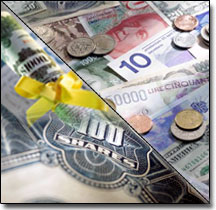
If you are interested in trading currencies online, you will find that the Forex market offers several advantages over equities trading.
24-Hour Trading
Forex is a true 24-hour market, which offers a major advantage over equities trading. Whether it’s 6pm or 6am, somewhere in the world there are always buyers and sellers actively trading foreign currencies.
Traders can always respond to breaking news immediately, and P&L is not affected by after hours earning reports or analyst conference calls.
After hours trading for U.S. equities brings with it several limitations. ECN’s (Electronic Communication Networks), also called matching systems, exist to bring together buyers and sellers – when possible.
However, there is no guarantee that every trade will be executed, nor at a fair market price.
Quite frequently, traders must wait until the market opens the following day in order to receive a tighter spread.
Superior Liquidity
With a daily trading volume that is 50x larger than the New York Stock Exchange, there are always broker/dealers willing to buy or sell currencies in the FX markets.
The liquidity of this market, especially that of the major currencies, helps ensure price stability. Traders can almost always open or close a position at a fair market price.
Because of the lower trade volume, investors in the stock market are more vulnerable to liquidity risk, which results in a wider dealing spread or larger price movements in response to any relatively large transaction.
100:1 Leverage
100:1 leverage is commonly available from online FX dealers, which substantially exceeds the common 2:1 margin offered by equity brokers. At 100:1, traders post $1000 margin for a $100,000 position, or 1%.
While certainly not for everyone, the substantial leverage available from online currency trading firms is a powerful, moneymaking tool.
Rather than merely loading up on risk as many people incorrectly assume, leverage is essential in the Forex market.
This is because the average daily percentage move of a major currency is less than 1%, whereas a stock can easily have a 10% price move on any given day.
The most effective way to manage the risk associated with margined trading is to diligently follow a disciplined trading style that consistently utilizes stop and limit orders. Devise and adhere to a system where your controls kick in when emotion might otherwise take over.
Lower Transaction Costs
It is much more cost-efficient to trade Forex in terms of both commissions and transaction fees. FOREX companies usually charge NO commissions or fees whatsoever, while still offering traders access to all relevant market information and trading tools.
In contrast, commissions for stock trades range from $7.95 – $29.95 per trade with online discount brokers up to $100 or more per trade with full service brokers.
Another important point to consider is the width of the bid/ask spread.
Regardless of deal size, forex dealing spreads are normally 5 pips or less (a pip is .0005 US cents). In general, the width of the spread in a forex transaction is less than 1/10 that of a stock transaction, which could include a .125 (1/8) wide spread.
Profit Potential in Both Rising and Falling Markets
In every open FX position, an investor is long in one currency and short the other. A short position is one in which the trader sells a currency in anticipation that it will depreciate. This means that potential exists in a rising as well as a falling market.
The ability to sell currencies without any limitations is another distinct advantage over equity trading.
In the US equity markets, it is much more difficult to establish a short position due to the Zero Uptick rule, which prevents investors from shorting a stock unless the immediately preceding trade was equal to or lower than the price of the short sale.









